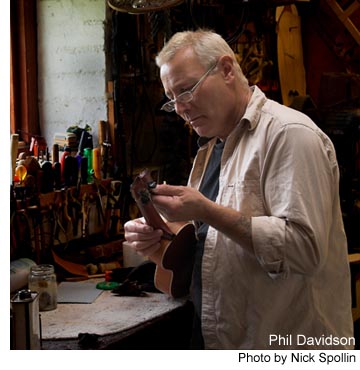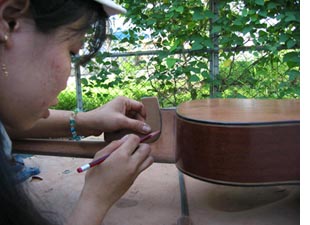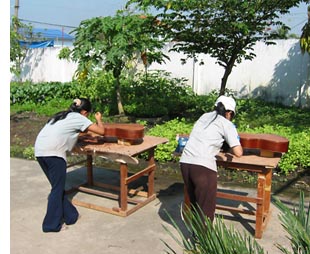Though it's unlikely that anyone reading this will have yet seen an Ashbury acoustic guitar (they were only launched in the UK in early 2007), the point of this story is less about the brand than the way guitar production has followed other businesses in recent years and chased round the Far East, in search of cheap labour. Sometimes it has worked, sometimes it hasn't, but it seems to have succeeded for Ashbury. The UK developer of the brand, Gremlin Music, is a well-run, innovative business and its founder, Pete McClelland, instead of just chancing that the guitars would be ok when they arrived, despatched British luthier Phil Davidson to offer advice and see for himself how guitar production is done, Vietnamese style. This article appeared in the January 2007 issue of Music Trade News.
ASHBURY GUITARS - MADE IN VIETNAM
 With mass market guitar production now firmly settled in China, where low labour rates and an almost infinite workforce seem likely to secure it for the foreseeable future, it is tempting to think that the game of 'chase the cheapest production source', is over. But while that is almost certainly true for the mass market, it ignores the awkward mid-market guitar sector, sandwiched between basic instruments and the top-end aspirational lines, still largely produced in the USA. Although at the moment dominated by Korea (once, itself, the source for the world's cheap guitars but now effectively priced out of that market) it seems likely that manufacturers there will eventually feel the pinch they once dealt to Japanese producers, as they lose the middle market, too. But who will win it?
With mass market guitar production now firmly settled in China, where low labour rates and an almost infinite workforce seem likely to secure it for the foreseeable future, it is tempting to think that the game of 'chase the cheapest production source', is over. But while that is almost certainly true for the mass market, it ignores the awkward mid-market guitar sector, sandwiched between basic instruments and the top-end aspirational lines, still largely produced in the USA. Although at the moment dominated by Korea (once, itself, the source for the world's cheap guitars but now effectively priced out of that market) it seems likely that manufacturers there will eventually feel the pinch they once dealt to Japanese producers, as they lose the middle market, too. But who will win it?
It is perfectly possible, of course, that China will capture this mid-market guitar business as well as the entry level - particularly given the rapidly advancing quality levels of the best Chinese factories, but that hasn't happened yet and while the Chinese work up to that level, other manufacturers from other countries are competing, too. Indonesia is one source often mentioned in this context - but there is also Vietnam. As MTN revealed last month, one UK company, Gremlin Music, is sourcing its new Ashbury range of acoustic and electro-acoustics from a Vietnamese supplier and this Autumn sent the Bristol-based luthier, Phil Davidson, to its Saigon factory to make sure all was going well with the first production batch. His experience suggests that picking up a few words of Vietnamese just might be a worthwhile investment for the next decade or so.
Davidson's trip to Vietnam came on the back of a 20 year relationship with Gremlin - supplying the distributor with (by his own admission) insufficient quantities of his handmade mandolins to meet demand, while simultaneously becoming Britain's premier banjo maker and wining a reputation as one of our best luthiers. As such, he sets high standards, but what had he found in Saigon? How had the trip turned out?
'The factory is owned by a really remarkable man, John Jiang - an absolute gentleman of the first order. John, who was originally from Taiwan, has a degree in classical guitar from New York University and is a top player and a luthier as well. Five years ago, he decided he was going to set up a guitar factory and he went to Vietnam, because of the workers - not because of the cheap labour, but because they are exceptional at what they do. They have an inherent talent for accuracy and meticulous work. He's now got 40 former farm labourers, rice growers, who had never seen a guitar before in their lives and he has personally trained them to make very, very fine guitars.
 'One of the many things that impressed me was that they make their guitars exactly the way I make mine - by hand and one at a time. The only significant difference is that he has bigger machinery, where machines are used, and he has forty people doing it, where I have just myself.
'One of the many things that impressed me was that they make their guitars exactly the way I make mine - by hand and one at a time. The only significant difference is that he has bigger machinery, where machines are used, and he has forty people doing it, where I have just myself.
'The quality they are producing there is so good that, really, all I was doing was giving them some style pointers and a few tips on finishing. But in terms of making the instruments, they had it just right. While I was there, I took the opportunity to get the mandolin project started which I have been working on with Gremlin and which will be coming later, which meant I didn't get my tour of the Mekong Delta - I spent all my time at the factory, but that was an education in itself.'
Given even a minimal knowledge of Vietnamese geography, one assumes the country has a plentiful supply of wood - a huge potential source of materials should production settle there. Although Davidson confirms there is no shortage of raw materials, the Saigon factory is actually using a fair amount of imported timber, he says.
'I admit I was scared to death of seeing some horrible sweatshop factory, using heaven knows what materials, but it couldn't have been more different. There are strict employment laws - it is illegal to employ anyone younger than 18 - and the staff are well looked after, paid better than the average, fed and provided with uniforms: and they work so hard. They're obviously a happy bunch, they love their work and they are as keen as John Jiang is on getting the quality right. In fact the time they take on setting-up up amazed me: it's not like a factory, they set them up at least as well as I do - paying just as much attention.
'In terms of the wood used, they are actually importing quite a bit of it from bulk luthier suppliers - batches of tops of good European Spruce or Western Red Cedar, just the same as anyone else uses. Although there is some wonderful native wood in Vietnam, they don't grow Spruce, so that comes from Northern Europe, while the backs and sides are either imported Mahogany, Rosewood or a Vietnamese Rosewood called Rose Cherry, which is very nice.'
 Again working from that minimal knowledge of Vietnamese geography, what about the humidity levels? Much of the individual craftsmanship is done outdoors in conditions of intense heat and humidity - doesn't that suggest problems when the instruments arrive in dry, centrally heated western shops and homes?
Again working from that minimal knowledge of Vietnamese geography, what about the humidity levels? Much of the individual craftsmanship is done outdoors in conditions of intense heat and humidity - doesn't that suggest problems when the instruments arrive in dry, centrally heated western shops and homes?
'No, because they keep the instruments in one of four humidity-controlled rooms while they aren't being worked on, and while they are doing crucial stages of the work, like gluing the fronts on, that is done in a humidity controlled room, too, as is setting up.'
Prior to his career as a luthier, Davidson was an engineer - with that in mind, can he see this fledgling guitar industry expanding?
'John Jiang says he eventually wants a factory employing about 200 people - nothing bigger than that, because he doesn't want it to get beyond his personal control. But other people? Oh, yes! I was taken to see a furniture shop just up the road and was absolutely blown away by the pearl and abalone inlays being done on furniture - absolutely beautiful workmanship! They're not traditionally makers of stringed instruments, as far as I know, but they certainly have the aptitude and if they are motivated by a guy like John, they can do wonderful things.'
From what he has seen, could Davidson envisage Vietnam as the next source of quality guitars, with the mass market being catered for by Chinese plants? 'It's more than likely, I'd say. If John Jiang can achieve this in five years, then who can say what someone else with the same level of dedication could achieve? I know he is already making an absolutely beautiful small classical for the Finnish market and a wonderfully well engineered folding guitar for a company in Switzerland.'
With plentiful skilled labour, huge natural resources and an increasingly open attitude from government, it may turn out that Gremlin's decision to source from Vietnam has been prophetic. Only time will tell - but an eyewitness account from an expert is worth a 1,000 press releases. And Phil Davidson returned to the UK a very impressed man indeed.
Ends.
 With mass market guitar production now firmly settled in China, where low labour rates and an almost infinite workforce seem likely to secure it for the foreseeable future, it is tempting to think that the game of 'chase the cheapest production source', is over. But while that is almost certainly true for the mass market, it ignores the awkward mid-market guitar sector, sandwiched between basic instruments and the top-end aspirational lines, still largely produced in the USA. Although at the moment dominated by Korea (once, itself, the source for the world's cheap guitars but now effectively priced out of that market) it seems likely that manufacturers there will eventually feel the pinch they once dealt to Japanese producers, as they lose the middle market, too. But who will win it?
With mass market guitar production now firmly settled in China, where low labour rates and an almost infinite workforce seem likely to secure it for the foreseeable future, it is tempting to think that the game of 'chase the cheapest production source', is over. But while that is almost certainly true for the mass market, it ignores the awkward mid-market guitar sector, sandwiched between basic instruments and the top-end aspirational lines, still largely produced in the USA. Although at the moment dominated by Korea (once, itself, the source for the world's cheap guitars but now effectively priced out of that market) it seems likely that manufacturers there will eventually feel the pinch they once dealt to Japanese producers, as they lose the middle market, too. But who will win it? 'One of the many things that impressed me was that they make their guitars exactly the way I make mine - by hand and one at a time. The only significant difference is that he has bigger machinery, where machines are used, and he has forty people doing it, where I have just myself.
'One of the many things that impressed me was that they make their guitars exactly the way I make mine - by hand and one at a time. The only significant difference is that he has bigger machinery, where machines are used, and he has forty people doing it, where I have just myself.  Again working from that minimal knowledge of Vietnamese geography, what about the humidity levels? Much of the individual craftsmanship is done outdoors in conditions of intense heat and humidity - doesn't that suggest problems when the instruments arrive in dry, centrally heated western shops and homes?
Again working from that minimal knowledge of Vietnamese geography, what about the humidity levels? Much of the individual craftsmanship is done outdoors in conditions of intense heat and humidity - doesn't that suggest problems when the instruments arrive in dry, centrally heated western shops and homes?